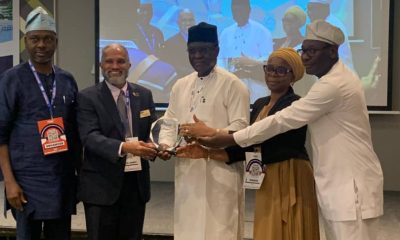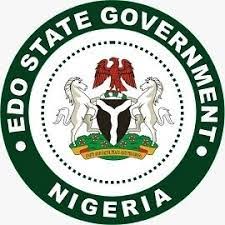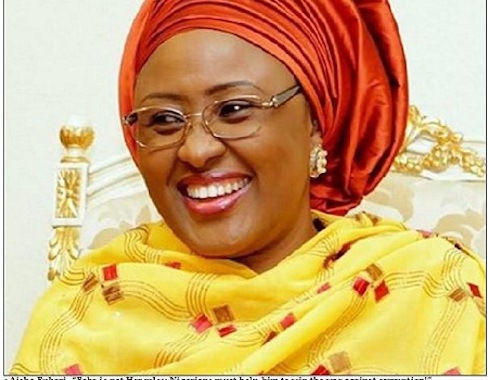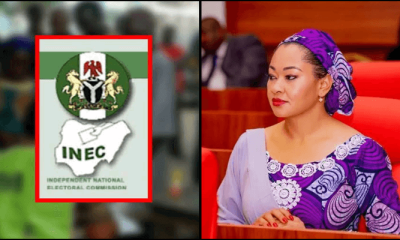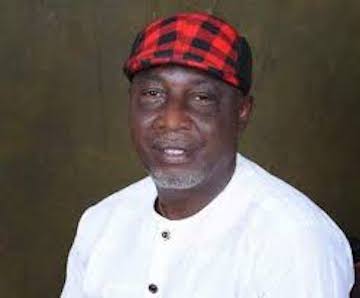OPINION
Tinubu’s Masterstroke, Local Private Refineries and Macabre Regulators

By Richard Elesho
Thankfully, President Bola Tinubu on Monday July 29, 2024, pulled a masterstroke to calm agitated nerves in the nation’s petroleum industry. He directed that crude oil be sold henceforth to Nigeria’s largest petroleum investment, adjudged to be the second largest in the world, the Dangote Refinery and Petrochemical Company, in the nation’s local currency, the naira.
The new policy will similarly apply to other petroleum refining outfits in the country, notably the modular refineries located predominantly in the oil-rich states in the South South zone. Before Tinubu’s intervention, the Nigerian business environment had been loudly tempestuous. On a good day, Aliko Dangote, reputed to be Africa’s wealthiest man, is not a man of many words. His calm, cool, and calculated look may belie the size of his stupendous wealth. But looking every inch like the one beneath in a rowdy dog fight, a fortnight ago, he lost his signature sober mien during an exclusive media engagement. His frustrations were palpable as he made a pyrrhic offer to abandon his legacy investment in the petroleum sector.“Let them (the Nigerian National Petroleum Company Ltd, (NNPCL) buy me out and run the refinery the best way they can. They have labelled me a monopolist. That’s an incorrect and unfair allegation, but it’s fine. If they buy me out, at least, their so-called monopolist would be out of the way. It does appear that some people are uncomfortable that I am in the picture.So I am ready to let go, let the NNPC buy me out, and run the refinery.” Dangote is the metaphor of a dog pushed to the wall. He is, in fact, the aggregate of the frosty relationship between select operators in the petroleum industry and the regulatory agencies. The current hostility emanated from allegations by Ahmed Farouk, head of the Nigeria Midstream and Downstream Petroleum Regulatory Authority, (NMDPRA), that petroleum products refined in the country are adulterated. “Dangote refinery as well as some local refineries produce between 650 to 1200 ppm. So, in terms of quality, their quality is much more inferior to the imported quality.” He said.As to be expected, Farouk’s remarks have literally set the highly combustible industry on fire, with stakeholders calling for change of guards in the nation’s milk cow industry. The House of Representatives has initiated an investigation into the issues with a call on President Bola Tinubu, who doubles as Petroleum Minister to suspend the loquacious ACE.Similarly, the junior minister in the Ministry of Petroleeum Resources (Oil) Senator Heineken Lokpobiri held an emergency meeting with all stakeholders in his office on Monday, 22 July. Heads of the regulatory agencies and Dangote attended the meeting aimed at calming frayed nerves and ending the mbroglio. Taking into account the contributions of Dangote in the nation’s business firmament, he is one investor the Tinubu presidency will not want to trifle with. Same with other patriots respectively contributing their quotas to the nation’s gross domestic product, (GDP).Nigeria is an oil rich nation with an unenviable trajectory in the sector. The four state-owned refineries in Port Harcourt, Warri, and Kaduna have existed only in names for the better part of three decades, forcing the country to rely solely on fuel importation.Over time, the 650,000 bpd behemoth, Dangote Refinery, Lagos, and over two dozen modular plants across the country, some of which have started production and meeting demands in their geopolitical catchments were conceived. Notable among those in operation are Watersmith in Ibigwe, Imo State, Aradel in Ogbele Abua, Rivers State, Edo Refinery, OMSA PILLAR ASTEX COMPANY Limited (OPAC Refineries) and Azikel Refinery, Bayelsa StateDesigned to process a variety of crudes, including African, Middle Eastern, and the American light oil, Dangote Refinery is the biggest single train refinery in the world. It covers approximately 2,635 hectares and has a total storage capacity of 4.5 billion litres enough for 20 days of crude requirement.The refinery has a sea port and 435 MW power plant that can meet the total energy requirement of Ibadan Electricity Company in charge of power supply to five states, namely Oyo, Ogun, Osun, Kwara, and Ekiti. Embedded in the gargantuan enterprise are petrochemical and fertilizer plants. Its workers are in excess of 30,000.When these facts are added to the number of people employed by the modular refineries, and their potentials for both local and international trade, it won’t be difficult to see the connection between those minding the regulatory agencies and economic sabotage. Indeed, the operational environment for the indigenous investors seems to be losing its clemency. There have previously been alarms raised about difficulty in accessing crude, raw materials, and other bottlenecks.Farouk may have played the ostrich. Aside from its bureaucratic services, the agency that he heads and the NNPCL, led by Mele Kyari, have the mandate to permanently station their men on the ground in each of the refineries for quality control and to ensure compliance with best global practices. What could have happened to this process before the media trial? In any case, several tests conducted on products of indigenous refineries have confirmed them to be of international standard. Members of the House of Representatives, media practitioners, and other stakeholders who visited the $20 billion investment in Lagos all confirmed the low sulphur content of the products.Many people have located the essence of Farouk’s outbursts in what is described as his rabid desire for the country to sustain the satanic fuel importation regime. Dangote, who insisted on the integrity of his products, alluded to this when he said some senior executives of the NNPCL, own blending plants abroad. “We know where they blend these things. Some of the NNPC people and some traders have opened a blending plant somewhere off Malta. We all know these areas. We know what they are doing,” Dangote said.The dogged industrialist ought to know. While Kyari has made a lame attempt to extricate himself from the indictment, Farouk has kept sealed lips. The rising fuel importation portfolio into Nigeria from Malta, an archipelago in the Mediterranean southern Europe, corroborates Dangote’s assertion. Information obtained from Trademap, an international data company, shows that there were no imports from Malta between 2017 and 2022. It is, however, curious that there has been a sudden surge to $2 billion (and still rising) fuel importation from Malta Island since 2023 to date!Many Nigerians have called for a ceasefire in the interest of the fatherland. One of such is Dr. Akinwumi Adesina, President, Africa Development Bank, (AfDB). Hear him: “This whole disparaging of Dangote is uncalled for. It is self-defeating. And it is very bad for Nigeria.Who will want to come and invest in a country that disparages and undermines its own largest investor?” Investing is tough. Pettiness is easy. It sadly sends a signal that the price for sacrificing for Nigeria is to get sacrificed…We must not be myopic.” Indigenous investment is the surest route to getting the Nigerian economy out of the woods. A word, as they say, is enough for the wise.Elesho is a Senior Editor with The News.
OPINION
Buhari: Lessons in Leadership and Patriotism

By Ismail Abdulaziz
On July 13, retired Maj.-Gen. Muhammadu Buhari, former President of Nigeria, passed away after the mid-day prayers at a London Clinic at the ripe age of 82.Many testimonies about his life and times indicate a man of civility, discipline and patriotism not adding his avowed principle of living a Spartan life and commitment to eradication of corruption.
President Bola Tinubu, paid a glowing tribute. ‘’Buhari was to the very core, a patriot, a soldier, a statesman; his legacy of service and sacrifice endures.“He served Nigeria with unwavering dedication, first as a military leader from January 1984 to August 1985, and later as a democratically elected President from 2015 to 2023; duty, honour, and a deep commitment to the unity and progress of our nation defined his life.“He stood firm through the most turbulent times, leading with quiet strength, profound integrity, and an unshakable belief in Nigeria’s potential.“He championed discipline in public service, confronted corruption head-on, and placed the country above personal interest at every turn,’’ the president said.Similarly, the revered Islamic scholar, Mufti Ismail Menk, said Buhari was an upright man, who never missed his prayers and a very disciplined believer who served his people to the best of his ability.“His name was synonymous with integrity.“He was definitely one of those who made me develop a much better perception of Nigerians as a people,’’ he said.The U.S. Mission in Nigeria also condoled with Nigeria.“Buhari was a leader whose life was defined by service, discipline, and a commitment to restore integrity to public office.“His legacy includes his efforts to strengthen Nigeria’s democratic institutions,’’ it said.The Chinese embassy in Nigeria also expressed its condolences.‘’We mourn a resolute leader whose unwavering dedication to Nigeria’s unity and progress leaves an enduring legacy.“His pivotal contributions to advancing China-Nigeria relations will forever remain etched in our shared history,’’ it said.Former President Olusegun Obasanjo, who was also a former military Head of State like Buhari, said the late president was a comrade, a cool patriot, who as a soldier, played his role.“As an administrator, he played his role as an administrator; as a statesman, he played his role as a statesman.“At a time like this, we need the totality of the experience and what I may call statesmanship of all those who have had opportunities to run the affairs of this country to get us out of the situation we are in; he will be sorely missed; may his soul rest in perfect peace,” Obasanjo said.Tributes have also come in from the Ethiopian Prime Minister Abiy Ahmed Ali, Sierra Leone President Julius Maada Bio as well as World Trade Organisation Director-General Ngozi Okonjo-Iweala.During his campaign in 2015, something spectacular happened.The masses of Nigeria decided to contribute their widows’ mites for his success.What else can a human want than the general believe in his capacity and ability to lead them to the Promised Land?This singular act was a burden placed on him by the people to rectify the past.Analysts say the history of Nigeria will be replete with the roles Buhari played during his three terms leading the country.First, as a military head of state and subsequently, as a democratically elected president between 2015 and 2023.For history to be kind to him, the testimonies of those around him during his time will shape the final options.As an elder statesman, Ibrahim Badamasi Babangida once said: “History will be kind to you for taking a decision, but will never be kind to you for not taking a decision.”Buhari accepted most of the mistakes he took while serving the people as exemplified in one of his statements in the course of his handing over the reign of leadership to President Tinubu.“Whoever thought that there has been some form of injustice on him we are all humans, there is no doubt I hurt some people, and I wish they would pardon me and those who think that I have hurt them, please pardon me.”The man that peacefully handed over power to Buhari, former President Goodluck Jonathan, has some comforting words.‘’He will be remembered as a courageous leader, a disciplined officer, and a committed public servant who made considerable contributions towards the peace and progress of our dear nation.“The late President was deeply admired across the strata of society for his decency, integrity and exemplary life of service.“As a leader, he was selfless in his commitment to his duty and served the country with character and a deep sense of patriotism.‘’In his passing, Nigeria has lost one of its foremost leaders, and I have lost a respected colleague and elder.“His legacy will continue to endure in the hearts of all who value sacrifice, integrity, perseverance and devotion to national ethos,’’ Jonathan said.Buhari was born on Dec. 17, 1942 in Daura, Katsina State to Adamu and Zulaiha Buhari.He was raised by his mother, following the death of his father when he was about four years old; he had his primary school education in Daura and Maidua from 1948 to 1952, before proceeding to Katsina Middle School in 1953.He joined the Nigerian Army in 1961 when he was admitted to the Nigerian Military Training College, Kaduna.Buhari underwent Officer Cadets training at Mons Officer Cadet School in Aldershot, England from 1962 to 1963, and was commissioned as Second Lieutenant in January, 1963.He attended the Nigerian Military College, Kaduna for the Platoon Commanders’ Course from 1963-1964Buoyed by a deep sense of patriotism and commitment to national service, Buhari entered politics in 2003, following Nigeria’s return to a democratic dispensation in 1999.Buhari joined the All Nigeria People’s Party (ANPP) and contested the presidential election on its platform that year.He lost to the presidential candidate of the People’s Democratic Party (PDP) Olusegun Obasanjo.Undeterred by defeat, Buhari continued his political struggle, and on Dec. 18, 2006, he emerged as the consensus presidential candidate of the ANPP for the 2007 elections.His main challenger in the April 2007 presidential polls was the ruling PDP candidate, Umaru Yar’Adua.In the election, Buhari officially scored 18 percent of the total votes cast, against 70 percent for Yar’Adua.In March 2010, Buhari left the ANPP and formed, with some of his supporters, the Congress for Progressive Change (CPC).Buhari was nominated as the CPC presidential candidate on April 16, 2011 for that year’s general election.He ran against the then incumbent, President Jonathan of the ruling PDP, Malam Nuhu Ribadu of the Action Congress of Nigeria (ACN), Ibrahim Shekarau of the ANPP, and other candidates of smaller parties.Using the platform of the CPC, a newly formed party, Buhari was able to garner 12, 214, 853 votes, coming second to Goodluck Jonathan of the Peoples Democratic Party(PDP), who polled 22, 495, 197 votes.In 2015, under the platform of the All Progressives Congress (APC), Buhari won the presidential elections of March 28, defeating the incumbent Jonathan of PDP.He was sworn into Office as President, Commander-In Chief of the Armed Forces, and Federal Republic of Nigeria on May 29, 2015.After eight years in office, Buhari ensured a smooth transition process; in May 29, 2023, he handed over power to President Bola Tinubu who was also elected under the platform of APC in the February, 2023 presidential election.(NAN)OPINION
Naira Spraying Crackdown: Cultural Policing or Economic Necessity?

In recent months, Lagos has witnessed a sharp intensification of the crackdown on spraying naira notes at social events, with the Economic and Financial Crimes Commission leading enforcement efforts to uphold currency integrity.In April 2025, popular Lagos socialite Emeka Okonkwo, known as E-Money, was arrested for allegedly spraying both naira and US dollars at public gatherings, an act that violates Nigeria’s currency laws.
In the same month, two social media influencers, Tobilola Olamide (TobiNation) and Peter Olaitan (TDollar), were convicted and sentenced to six months imprisonment or a fine for spraying naira notes at a Lagos event, based on viral TikTok videos that triggered EFCC investigations. These cases underscore the government’s renewed commitment to enforcing the Central Bank Act provisions against currency abuse, amid growing concerns over inflation and economic stability.Beyond Lagos, notable Nigerians have also faced arrest and conviction for spraying naira under the Central Bank Act. Idris Okuneye (Bobrisky) was convicted in April 2024 and sentenced to six months’ imprisonment after his March arrest for spraying at Lagos events.Actress Oluwadarasimi Omoseyin was arrested in February 2023 for spraying and stepping on new naira notes at a wedding in Lagos, receiving a six-month jail term with an option of a fine. A makeup artist, Abdullahi Huseini (Amuscap), was sentenced to six months’ imprisonment in Kano for spraying at his wedding. Cubana Chief Priest was also arrested, etc.We praise the EFCC and the government for doing a great job of protecting the integrity of the naira by ensuring that abusers are punished. We wish and pray that the same swiftness and assurance of convictions be visited on other issues, such as political corruption and insecurity.According to a report by Daily Post 2021, Mr Akin Adewale from a first-generation bank said it was good so that money would not be devalued. What the CBN said was that it spent a lot of money printing it, and the cost is passed on to the economy in the long run. He said, “If the money is rough or torn, its life span is reduced, and printing becomes more frequent, which leads to inflation.”Any person who has been in the country since 2021 will know that the devaluation of the Nigerian currency is closely related to inflation.But what about the cultural significance of spraying money among Nigerian communities?To criminalise spraying money without acknowledging its cultural weight risks violating the social rhythms that bind communities together.In Yoruba culture, spraying money is a revered symbol of honour and respect. It is a way to publicly celebrate and support the success and status of loved ones, affirming social bonds and communal pride. For the Igbo, spraying is an expression of joy and solidarity, a ritual that marks milestones and reinforces communal support. Among the Hausa-Fulani, though less common, similar acts of generosity during celebrations symbolise goodwill and social harmony. The same is also true of many other ethnic groups in the country.Beyond mere festivity, spraying money is a powerful social symbol; it represents abundance, generosity, and the collective sharing of fortune. It is a language of respect, a way to uplift individuals while strengthening community ties. To clamp down on this practice without sensitivity is to risk eroding a cherished cultural expression that nurtures social cohesion.No doubt, many countries have laws prohibiting the mutilation or defacement of currency to protect their integrity. Singapore, Sri Lanka, Australia, the United States, the United Kingdom, and Canada all enforce penalties, ranging from fines to imprisonment, against damaging their money.These regulations reflect a global consensus that currency is both a medium of exchange and a national symbol essential for economic stability. It means Nigeria’s Central Bank Act similarly criminalises currency abuse, including spraying naira notes, to safeguard the naira in line with the value that other nations of the world uphold.By implication, therefore, the culture of enjoying money spraying as a social bonding avenue is an aberration that followed normal political impunity in Nigeria. It’s not really a piece of culture rooted in African cosmology.Political and class dimensions also raise concerns about selective justice and unequal treatment of the elite versus ordinary people. Many countries indeed criminalise the mutilation or defacement of currency to protect its integrity, and Nigeria’s Central Bank Act follows this global practice by outlawing acts like spraying naira notes. However, this raises a deeper question: is criminalising currency abuse more important than implementing policies that genuinely uplift the lives of Nigerians?One must wonder whether the Nigerian government’s crackdown is driven by a sincere commitment to economic reform or simply an attempt to imitate other nations without addressing more pressing issues. It is normal for governments to prioritise certain policies, but if the focus is on enforcing currency laws, then why has there been so little progress in prosecuting terrorists, corrupt officials, or those who steal public funds? Why are governors and government officials rarely held accountable under the law, including the Bank Act?For instance, an online report showed that Thomas Ekpemupolo, known as Tompolo, a former Niger Delta militant leader, was caught in a viral video from his April 54th birthday celebration dancing while N1,000 notes were sprayed and stepped on, actions considered naira abuse under Nigerian law.Following public outcry, the EFCC vowed in May to investigate and hold him accountable, stressing, “Nobody is above the law.” As of late June, there has been no public update on his arrest or arraignment. If the case of the former Niger Delta militant leader could go this way, how about when a governor or senator is seen committing such an offence? Yet the government ought to look into a balanced approach to naira spraying.No one is in support of mutilating the currency, but a balanced approach to the naira spraying crackdown could help preserve cultural heritage while protecting the currency’s integrity. One solution is public education to raise awareness about the legal restrictions and the economic impact of currency mutilation, encouraging celebrants to handle naira notes with care rather than abandoning the tradition altogether.Additionally, regulated practices could be established where spraying is done respectfully and with minimal damage, such as using designated fresh notes or limiting the amount sprayed, distinguishing between cultural honour and currency abuse. This middle ground respects the ritual’s social significance while aligning with legal and economic concerns.Outright bans risk alienating communities and eroding cultural identity, whereas education, innovation, and sensible regulation offer a path to harmonise tradition with the imperative to protect Nigeria’s fragile economy.Most importantly, instead of merely emphasising the sanctity of the naira, Nigeria should strive to uphold the true rule of law, ensuring justice, fighting corruption, and protecting citizens, just as many other countries do. Without this broader commitment, focusing solely on currency integrity risks appearing superficial and disconnected from the urgent needs of the people.Dr Mbamalu, a Jefferson Journalism Fellow, member of the Nigerian Guild of Editors and media consultant, is the publisher of Prime Business AfricaOPINION
Two Sides of Late Major General Muhammadu Buhari

The late Major General Muhammadu Buhari, who famously overthrew the government of Alhaji Shehu Shagari, struck like a thunderbolt. His death, announced yesterday, July 13, 2025, shocked the nation, especially as he appeared healthier than when he was elected President of Nigeria in 2015.
In reflecting on his life and legacy, it is essential to compare the two distinct eras of Buhari’s leadership: first as a military ruler and later as a democratically elected president. As a military president, Buhari was often perceived as a no-nonsense leader who implemented significant reforms that impacted the political, economic, and social landscape of Nigeria. His initiatives included:i. War Against Indiscipline;ii. Import Substitution Industrialization Policy;iii. Go Back to Land Programme; andiv. Foreign Policy InitiativesThe announcement of his coup triggered panic among second Republic politicians, who went into hiding, fearing the unknown. Their concerns were not unfounded; the brutal orders that followed forced many into detention without trial for extended periods. While these policies are attributed to General Buhari, some believe they were largely orchestrated by General Tunde Idiagbon, his Chief of Staff, a bold and incorruptible officer who played a crucial role in implementing Buhari’s agenda.Ambassador Lawal Rafindadi, the Director General of the National Security Organization (NSO), also significantly influenced Buhari’s policies. Under his leadership, the NSO detained numerous Nigerians and a few foreigners without trial, while also investigating high-profile corruption cases, including that of Umaru Dikko.Buhari’s name incited a mix of fear and admiration among Nigerians; while his policies benefitted many, they caused distress for others. There is a prevailing belief that Idiagbon and Rafindadi were the true engines of governance during Buhari’s regime. His subsequent overthrow by General Ibrahim Babangida and the ensuing years of incarceration were reminiscent of the betrayal faced by Julius Caesar.When Buhari returned to power as the elected president in 2015, many Nigerians expressed hope that he would revive the transformative policies of his military rule. However, the reality was starkly different; the economy continued to plummet, corruption surged, and social cohesion deteriorated.This raises the question: Were the key figures who had previously supported Buhari—such as Tunde Idiagbon and Lawal Rafindadi—absent during his second tenure? Observing Nigeria’s political and economic landscape at the time, one might conclude that the nation had made progress in governance compared to Buhari’s first administration. Yet, familiar advisers from his earlier days remained influential, including figures like Malam Maman Daura, the late Mamud Tukur, Alhaji Magaji Danbatta, Professor Ango Abdullahi, and General Aliyu Gusau.Some critics have suggested that Buhari’s second coming could be summed up by the adage “once bitten, twice shy.” Rumor has it he confided to close friends that, in his youth, his aspirations to save Nigeria were thwarted; thus, he was unwilling to dedicate his later years to a country that had not recognized his contributions.Despite this backdrop, Buhari’s integrity remained intact. He personally rejected corruption; however, it appeared he overlooked the corrupt practices of those around him. His presence will be missed as a Nigerian statesman capable of fostering stability in various regions. His immediate family and allies will mourn his passing, as will many Nigerians who knew him well.As we ponder Buhari’s legacy, it remains unclear how history will ultimately judge him. Will he be remembered with fondness or skepticism? Only time will tell, as historians analyze his contributions and their impact on Nigeria.Simon Shango MFR writes from Abuja
